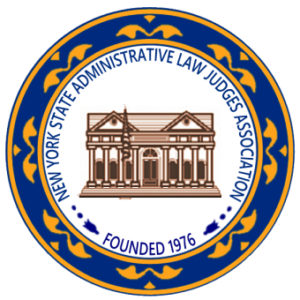THE NEW YORK STATE
ADMINISTRATIVE LAW JUDGES ASSOCIATION
 In 1976, the New York State Administrative Law Judges Association was formed as a state affiliate chapter of the National Association of Administrative Law Judiciary. As stated in our constitution and bylaws, our objective is to fulfil the purposes of our parent organization.
In 1976, the New York State Administrative Law Judges Association was formed as a state affiliate chapter of the National Association of Administrative Law Judiciary. As stated in our constitution and bylaws, our objective is to fulfil the purposes of our parent organization.
Our purposes, therefore, are to advance the highest standards of neutrality and fairness among administrative law judges and strongly advocating for avoiding any form of bias or discrimination in the hearing and decision making process, to work for, promote, and advocate the highest professional standards of administrative adjudication within the State of New York, foster the improvement of administrative processes, procedures and tribunals within the State of New York, study, analyze and compare administrative law and practice in New York State and other jurisdictions, for the purpose of better meeting these objectives, and advocate for the improvement of the professional conditions of our membership.
In 2016, we celebrated our 40th anniversary. With that milestone, we reaffirmed our mission of promoting and advocating for improvements in the administrative process and procedures together with studying and comparing administrative law and practice in New York and other jurisdictions. Our association has provided and sponsored professional development programs, written to the Governor and key legislators on important policy issues, and many of the members of our Executive Committee were active participants in drafting the Model Code of Conduct for State Administrative Law Judges, which was adopted by the New York State Bar Association in 2009.
Looking ahead, we are just as determined today, as we were in 1976, to enhance the quality of administrative justice and to find innovative and effective solutions for the improvement of administrative processes, procedures and tribunals in the State of New York.
MISSION
Like NAALJ, our mission is to promote an impartial, independent, and professional administrative judiciary adhering to high ethical standards and furthering the recognition and understanding of its necessary role in the function of government.
Our goals, therefore, are to provide leadership and professional development based on the following principles:
- Judicial independence in administrative adjudication is vital to fairness, impartiality, integrity, and public trust.
- Fair, equal, and accessible justice for all in administrative adjudication is vital to democracy.
- Inclusion and diversity within the administrative judiciary and awareness regarding inclusion and diversity demonstrate leadership and commitment to the meaning of “justice for all.”
- Organizational business operations are efficient and accountable.
- Innovative, timely, and well-presented continuing judicial education is critical to development and maintenance of a competent and efficient administrative law judiciary.
- Effective leadership is important to the “judges-as-
leaders” role of the administrative judiciary within NAALJ, within our memberships’ administrative courts, and in the general communities we serve.
VISION
- Providing and promoting high caliber professional development programs.
- To be a public voice promoting an impartial professional, competent and independent administrative judiciary.
- To be a public voice for fairness and accessibility in administrative adjudication.
- Collaborative relationships with other organizations with similar missions or shared interests.
- Sustaining and increasing an inclusive, diverse and participative membership.
- Promoting ethics and professionalism.
- Developing effective, successive organizational leadership.
- Efficient organizational operations.
VALUES
Through our mission, we bring life to the things we value:
- Commitment to the rule of law.
- Promotion of confidence in administrative courts and the administrative judiciary.
- Fair, equal, and accessible justice for all in administrative adjudication.
- Administrative judiciary independence.
- Inclusiveness and diversity in the administrative judiciary.
- Adherence to high ethical standards, including performance of duties without bias or prejudice.
- Administrative judiciary leadership.
- Administrative judiciary competence through innovative and timely legal education, professional development, networking, and peer support.
